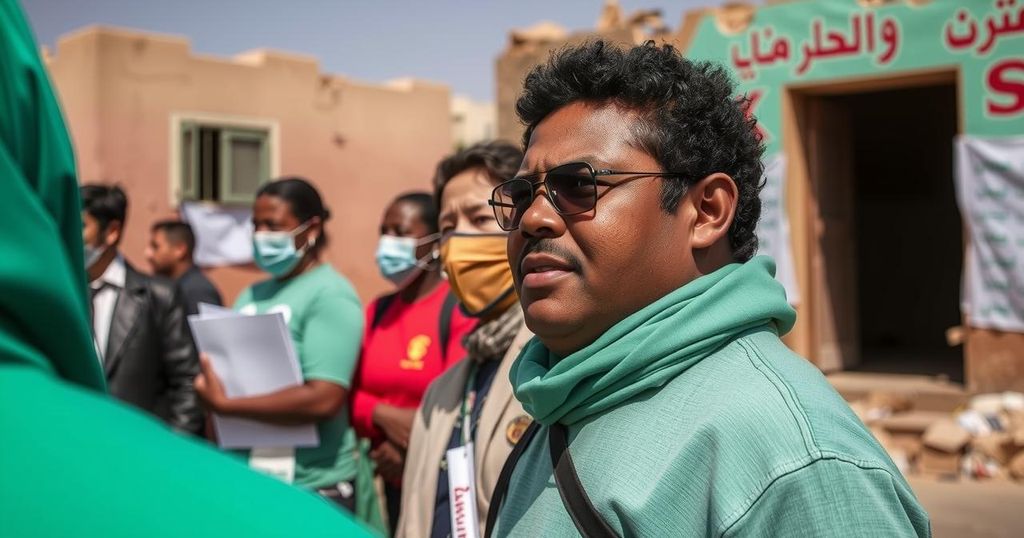Moroccan Activists Face Trial for Critiquing Slow Earthquake Recovery Efforts

Moroccan activists, including prominent Amazigh leader Said Ait Mahdi, face trial for criticizing the government’s sluggish earthquake recovery efforts. Their legal troubles stem from complaints by local officials regarding social media posts. As families displaced by the earthquake still wait for promised aid, activists are increasingly concerned over bureaucratic barriers and possible retaliatory actions.
Four Moroccan activists, including the notable Amazigh leader Said Ait Mahdi, are currently on trial for their public criticism of the government’s slow response to the devastating earthquake that struck in September 2023. Mr. Ait Mahdi has been detained since December 23 and faces serious charges including defamation and spreading false allegations, as detailed by his attorney, Mohamed Nouini. The remaining activists, who are part of the El-Haouz Earthquake Victims’ Coordination, also face accusations of insulting public officials and are pending court appearances scheduled for January 6, while they remain free. These legal actions were instigated by complaints from local officials who reportedly felt aggrieved by the activists’ social media posts.
The prosecution of these activists has raised considerable alarm among civil society groups, fearing that dissent regarding the government’s response to earthquake recovery efforts could lead to punitive repercussions. The Moroccan Association for the Support of Political Prisoners expressed their disapproval, stating, “We condemn the dangerous escalation of trials and prosecutions targeting bloggers and activists including Said Ait Mahdi and his fellows.”
In the aftermath of the earthquake, which displaced over 500,000 residents, many individuals are still residing in makeshift tents, facing harsh winter conditions. Recent footage shared on social media platforms highlights families struggling against the elements, with children suffering from the freezing temperatures during the New Year celebrations. The government has announced a significant $12 billion reconstruction initiative, alongside promises of financial assistance for severely affected families. However, there are growing concerns from activists alleging that most families are receiving minimal aid and that bureaucratic obstacles are hampering access to necessary resources.
Last month, many families protested outside the Moroccan Parliament, demanding accountability from Prime Minister Aziz Akhannouch during a parliamentary session. The protesters were not engaged by government officials, which only intensified their discontent regarding the discrepancies between governmental assurances and the realities faced by the affected population. The opposition Progress and Socialism Party has advocated for a thorough investigation into the government’s recovery efforts, emphasizing the need for transparency and efficiency amid rising charges of corruption and mismanagement.
Furthermore, in December, Interior Minister Abdelouafi Laftit disclosed that an investigation had been launched within his ministry, revealing at least one instance of an official soliciting bribes to expedite the distribution of reconstruction funds. For the thousands still enduring the cold and snowfall in temporary camps, the necessity for timely responses and corrective measures is increasingly urgent.
In September 2023, Morocco experienced a devastating earthquake that resulted in widespread destruction and a significant displacement of residents. As families faced the cold winter in makeshift accommodations, concern grew over the government’s pace in delivering promised aid and assistance. In response to the perceived incompetency and unresolved issues regarding the reconstruction efforts, activists emerged to voice their discontent, leading to their subsequent prosecution. The situation highlights broader concerns about government accountability, transparency, and the safety of those who publicly criticize the state.
The trial of four Moroccan activists, including Said Ait Mahdi, underscores the growing tension between the state and civil society in Morocco. As the slow response to the earthquake recovery unfolds, the activists face legal repercussions for voicing legitimate concerns regarding the distribution of aid. The situation reveals a dire need for government accountability and actionable solutions for families still suffering in temporary shelters. Overall, the unfolding events may signal a troubling trend for dissent and civic engagement in the country.
Original Source: www.newarab.com







